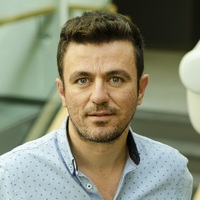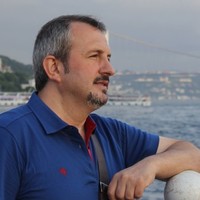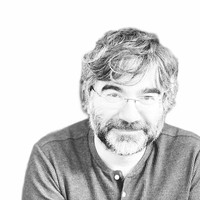
Alper Bilgili
Alper Bilgili is a sociologist specialized in sociology of science and sociology of religion. Currently he focused his studies on the relationship between religion and science. He received his B.A. and M.A. degrees in Political Science and International Relations from Boğaziçi University, and his Ph.D. in sociology from Istanbul University. He was formerly a post-doctoral researcher at the University of Leeds, in the School of Philosophy, Religion and History of Science. Bilgili delivered several courses on science and took part in projects on Islam in the Turkish context. He is the author of Bilim Ne Değildir? (What Science is not), Darwin ve Osmanlılar (Darwin and the Ottomans), and Bilim Susunca (When Science Goes Silent).
less
Related Authors
Ali Ömer Yurddaş
Üsküdar University, İstanbul, TURKEY
Dağhan Irak
The University of Huddersfield
Selahattin Bölükbaşı
Üsküdar University, İstanbul, TURKEY
Erkan Saka
Istanbul Bilgi University
Mehmet Türk
Gazi University
Mehmet Yusuf Balik
University of Gaziantep
InterestsView All (8)









Uploads
Papers by Alper Bilgili
So wrote Adnan Adıvar (1882–1955), the first minister of health of the Turkish Republic, to George Sarton in 1932. After explaining his interest in the discipline and admiration for Sarton’s work, Adıvar told Sarton about Salih Zeki, an Ottoman historian of science who wrote primarily on the history of mathematics, asking Sarton to accept two volumes of Zeki’s work as a gift. In response, Sarton asked Adıvar to write an article on Salih Zeki’s work for Isis. This marked the beginning of a new friendship which would last more than three decades. Impressed by Sarton’s friendship, Adıvar described his visit to Sarton at Cambridge, Massachusetts as a ‘pilgrimage’. Indeed, this is not the only example of Sarton inspiring a Turkish historian of science. In 1942, Aydın Sayılı became the first student to obtain a PhD degree in history of science from Harvard University under George Sarton’s supervision.
in Turkey is spearheading a multi-vocal religious sphere that is providing areas of influence to religious communities (cemaats). The significant question with regard to this changing structure in Turkey is whether this increasing influence of the cemaats will lead to an Islamicized Turkey. To answer
this question, the article argues that the emerging multi-vocal religious sphere is a result of the democratic climate that has been created out of the possibilities offered by globalization and European Union accession. Thus, multi-vocality should be interpreted as a normalization process that will redress
the problems created by the hyper-secularist practices of the early republican era, rather than an attack against the democratic pillars of the Republic.
certain social and political goals. Since the Young Turks, the conflict hypothesis −the view
that science and religion are necessarily and inevitably in conflict− was embraced by the
secularist elites and used to legitimise certain policies. The Galileo Affair ranks at the top
of the list of historical incidents that cause people to believe that the conflict hypothesis is
a plausible model for understanding the relationship between science and religion. This
article will not only refer to historical data to test the validity of this hypothesis, it will
also try to reveal the Western context that gave rise to conflict hypothesis’ emergence
and acceptance by science popularisers. Last but not least, Turkish myths concerning
Galileo and the way these myths were exploited in Turkish discussions on secularism
will be analysed.
betimlemesi içinse bilim sosyolojisinin başka ve daha “derin” tartışmalarda oynadığı rol analiz edilmelidir. Bilim sosyolojisi Türkiye’de çoğu düşünür tarafından bilimle din arasında olduğu varsayılan çatışmada kullanılacak bir araç olarak görülmüştür. Bunun yanında diğer bazı sosyologlar, bilim sosyolojisindeki temel teorilere Batı’nın bilimdeki üstünlüğüne dair argümanları eleştirmek için atıfta bulunmaktadırlar. Son
olarak, rölativizmden etkilenmiş bazı Türk bilim sosyologları, alandaki argümanları “büyük düşman” pozitivizm ile hesaplaşmada kullanırlar. Bu makale, alandaki temel
aktörlerin ve pozisyonlarının analizini yapmak suretiyle, Türkiye’deki bilim sosyolojisi tartışmaları hakkında kısa ve öz bir resim sunma niyetindedir.
Books by Alper Bilgili
Prof. Dr. Şükrü Hanioğlu
Princeton Üniversitesi
M. Şükrü Hanioğlu
Princeton Üniversitesi
So wrote Adnan Adıvar (1882–1955), the first minister of health of the Turkish Republic, to George Sarton in 1932. After explaining his interest in the discipline and admiration for Sarton’s work, Adıvar told Sarton about Salih Zeki, an Ottoman historian of science who wrote primarily on the history of mathematics, asking Sarton to accept two volumes of Zeki’s work as a gift. In response, Sarton asked Adıvar to write an article on Salih Zeki’s work for Isis. This marked the beginning of a new friendship which would last more than three decades. Impressed by Sarton’s friendship, Adıvar described his visit to Sarton at Cambridge, Massachusetts as a ‘pilgrimage’. Indeed, this is not the only example of Sarton inspiring a Turkish historian of science. In 1942, Aydın Sayılı became the first student to obtain a PhD degree in history of science from Harvard University under George Sarton’s supervision.
in Turkey is spearheading a multi-vocal religious sphere that is providing areas of influence to religious communities (cemaats). The significant question with regard to this changing structure in Turkey is whether this increasing influence of the cemaats will lead to an Islamicized Turkey. To answer
this question, the article argues that the emerging multi-vocal religious sphere is a result of the democratic climate that has been created out of the possibilities offered by globalization and European Union accession. Thus, multi-vocality should be interpreted as a normalization process that will redress
the problems created by the hyper-secularist practices of the early republican era, rather than an attack against the democratic pillars of the Republic.
certain social and political goals. Since the Young Turks, the conflict hypothesis −the view
that science and religion are necessarily and inevitably in conflict− was embraced by the
secularist elites and used to legitimise certain policies. The Galileo Affair ranks at the top
of the list of historical incidents that cause people to believe that the conflict hypothesis is
a plausible model for understanding the relationship between science and religion. This
article will not only refer to historical data to test the validity of this hypothesis, it will
also try to reveal the Western context that gave rise to conflict hypothesis’ emergence
and acceptance by science popularisers. Last but not least, Turkish myths concerning
Galileo and the way these myths were exploited in Turkish discussions on secularism
will be analysed.
betimlemesi içinse bilim sosyolojisinin başka ve daha “derin” tartışmalarda oynadığı rol analiz edilmelidir. Bilim sosyolojisi Türkiye’de çoğu düşünür tarafından bilimle din arasında olduğu varsayılan çatışmada kullanılacak bir araç olarak görülmüştür. Bunun yanında diğer bazı sosyologlar, bilim sosyolojisindeki temel teorilere Batı’nın bilimdeki üstünlüğüne dair argümanları eleştirmek için atıfta bulunmaktadırlar. Son
olarak, rölativizmden etkilenmiş bazı Türk bilim sosyologları, alandaki argümanları “büyük düşman” pozitivizm ile hesaplaşmada kullanırlar. Bu makale, alandaki temel
aktörlerin ve pozisyonlarının analizini yapmak suretiyle, Türkiye’deki bilim sosyolojisi tartışmaları hakkında kısa ve öz bir resim sunma niyetindedir.
Prof. Dr. Şükrü Hanioğlu
Princeton Üniversitesi
M. Şükrü Hanioğlu
Princeton Üniversitesi
Prof.Dr. Uğur Batı
Yazar